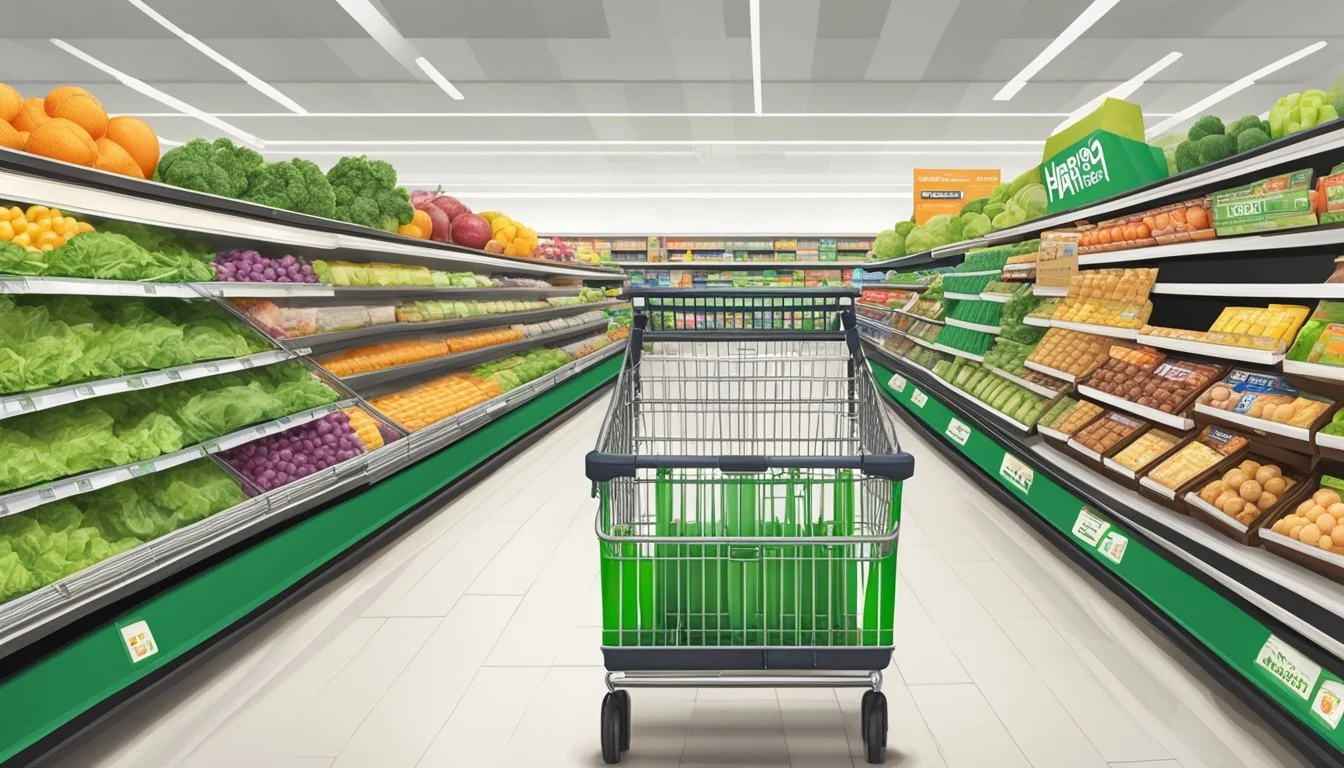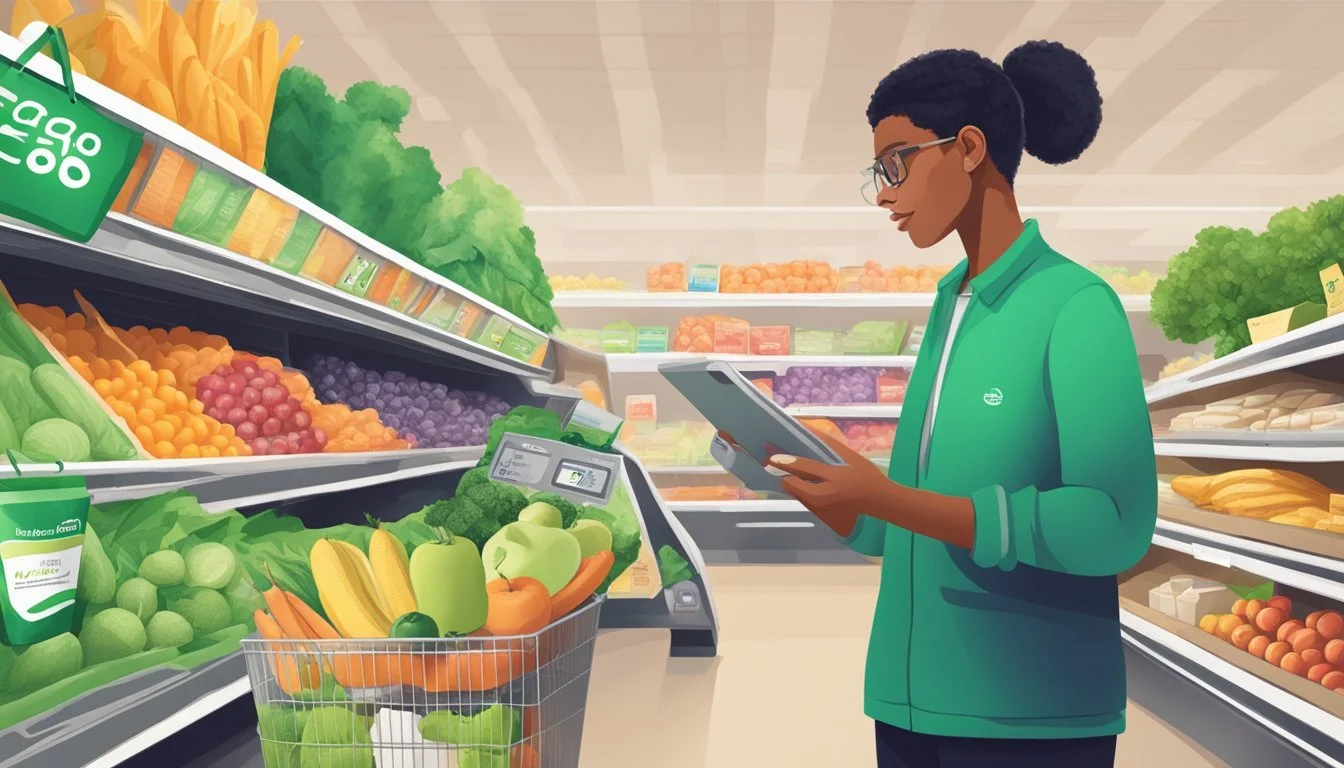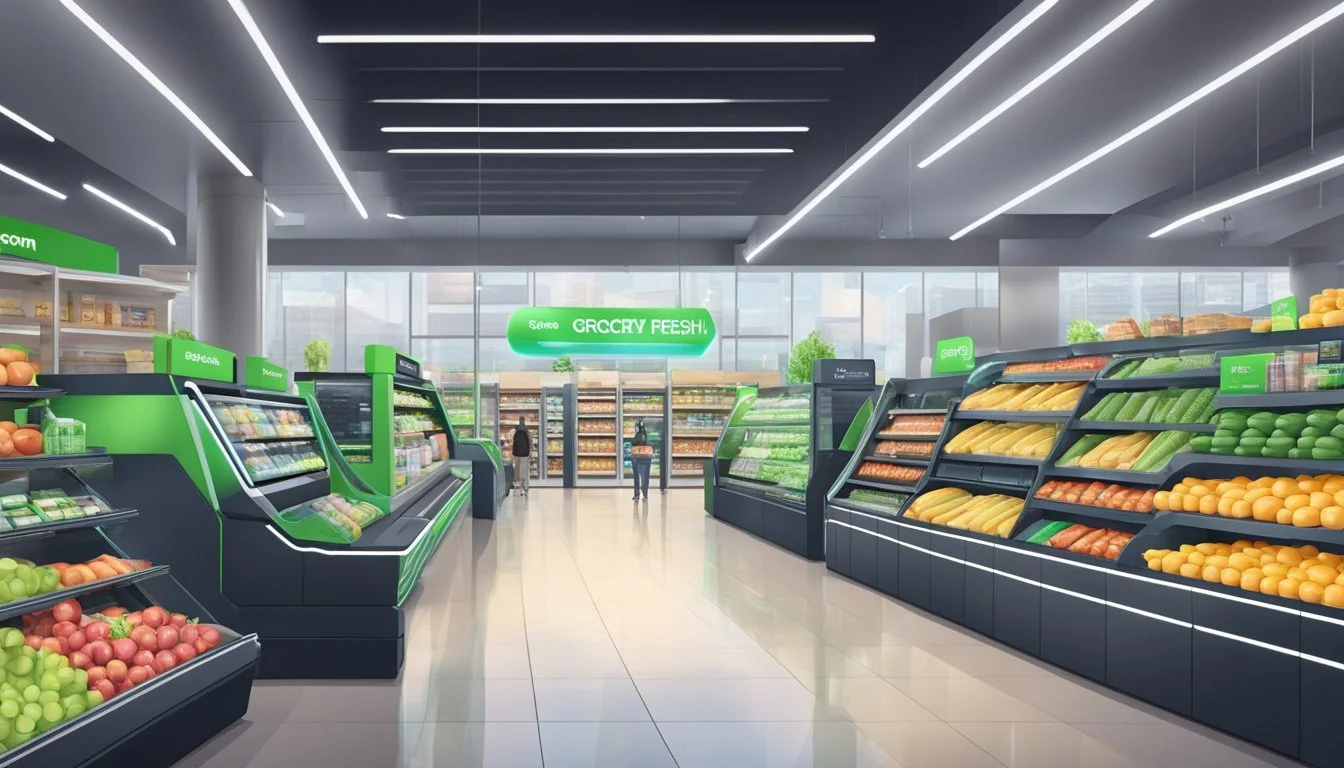Is Amazon Fresh Cheaper Than Harris Teeter?
A Price Comparison Analysis
Amazon Fresh and Harris Teeter are two popular grocery options for shoppers seeking quality products and competitive prices. Many consumers wonder which store offers better value for their money.
Based on price comparisons, Amazon Fresh tends to be cheaper than Harris Teeter for most grocery items. Amazon Fresh's pricing strategy allows them to offer competitive rates on a wide range of products, often undercutting traditional grocery stores.
While Harris Teeter is known for its high-quality products and excellent customer service, it typically has higher prices compared to discount retailers and online grocery services like Amazon Fresh. However, shoppers should consider factors beyond price, such as product selection, convenience, and overall shopping experience when choosing between these two options.
Overview of Amazon Fresh and Harris Teeter
Amazon Fresh and Harris Teeter represent two distinct approaches to grocery retail. Amazon Fresh leverages e-commerce technology, while Harris Teeter offers a traditional supermarket experience with a regional focus.
History and Business Models
Amazon Fresh launched in 2007 as Amazon's foray into online grocery delivery. It initially operated in select urban areas before expanding nationwide. The service integrates with Amazon Prime, offering same-day or next-day delivery of fresh produce, meats, and household items.
Harris Teeter, founded in 1960, began as a North Carolina-based grocery chain. It has since grown into a regional supermarket powerhouse. The company focuses on high-quality products and customer service, catering to a more upscale market segment.
Store Locations and Presence
Amazon Fresh maintains a primarily digital presence, with a growing number of physical stores in major U.S. cities. These brick-and-mortar locations feature cashierless technology and integration with online ordering.
Harris Teeter operates over 250 stores across seven states in the Southeastern and Mid-Atlantic regions. Its stronghold remains in North Carolina and Virginia. The chain is known for its clean, well-stocked stores and emphasis on fresh departments like produce and deli.
Price Comparison Factors
When comparing prices between Amazon Fresh and Harris Teeter, several key elements come into play. These include each retailer's pricing strategies, the costs of common grocery items, and the impact of store brands on overall pricing.
Pricing Strategies
Amazon Fresh and Harris Teeter employ different tactics to attract customers. Amazon Fresh leverages its Prime membership program, offering exclusive deals and free delivery on orders over a certain threshold. This can lead to significant savings for frequent shoppers.
Harris Teeter, on the other hand, focuses on weekly specials and a loyalty program called VIC (Very Important Customer). This program provides personalized discounts and fuel points for savings at participating gas stations.
Both retailers use dynamic pricing, adjusting costs based on demand and competition. Amazon Fresh may have an edge in quickly adapting prices due to its advanced technology infrastructure.
Common Items Price Comparison
A comparison of everyday groceries reveals varying price differences between the two retailers. Here's a sample comparison of common items:
Item Amazon Fresh Harris Teeter Milk (1 gallon) $3.49 $3.79 Eggs (1 dozen) $2.99 $3.29 Bread (1 loaf) $2.49 $2.69 Bananas (per lb) $0.49 $0.59
While Amazon Fresh appears slightly cheaper in this example, prices can fluctuate. It's important to note that Harris Teeter often runs promotions that may temporarily lower prices below Amazon Fresh's offerings.
Impact of Store Brands on Prices
Both Amazon Fresh and Harris Teeter offer their own store brands, which typically provide more affordable options compared to national brands. Amazon's 365 Everyday Value and Harris Teeter's HT Traders are examples of these private labels.
Store brands often cost 20-30% less than their branded counterparts. This price difference can significantly impact overall grocery bills, especially for budget-conscious shoppers.
Amazon Fresh may have a slight advantage in this area due to its ability to leverage Amazon's vast distribution network and data analytics to optimize pricing for its store brand products.
Cost Analysis of Grocery Shopping
Comparing grocery prices between Amazon Fresh and Harris Teeter reveals key differences in affordability and value. Both retailers offer competitive pricing strategies and unique advantages for shoppers.
Average Prices of Groceries
Amazon Fresh generally offers lower prices on many common grocery items compared to traditional supermarkets like Harris Teeter. A basket of typical household staples at Amazon Fresh often costs 5-10% less than at Harris Teeter.
Produce prices at Amazon Fresh tend to be particularly competitive, with fruits and vegetables frequently priced lower than at Harris Teeter. Meat and dairy products also show savings at Amazon Fresh in many cases.
However, Harris Teeter sometimes beats Amazon Fresh on certain items, especially store-brand products. Shoppers may find better deals on some packaged goods and non-perishables at Harris Teeter.
Membership and Discount Programs
Amazon Prime members receive additional benefits when shopping at Amazon Fresh, including exclusive discounts and free delivery on orders over a certain threshold. This can lead to significant savings for frequent shoppers.
Harris Teeter offers its own loyalty program, VIC (Very Important Customer), which provides personalized coupons and discounts. Members can accumulate points for future savings.
Prime membership costs $139 annually, while Harris Teeter's VIC program is free to join. The value of each program depends on individual shopping habits and frequency.
Promotional Sales and Discounts
Both retailers run regular promotional sales and offer digital coupons. Amazon Fresh features "Fresh Deals" with rotating weekly discounts on select items.
Harris Teeter is known for its "Super Doubles" events, where coupons up to $2 are doubled in value. These events can lead to substantial savings for savvy shoppers who plan their purchases accordingly.
Amazon Fresh occasionally offers percentage-off promotions for first-time customers or on specific categories. Harris Teeter provides senior discounts on certain days and military discounts year-round.
Comparing sale prices and using available coupons at both stores can help maximize savings. Shoppers may find the best value by cherry-picking deals from each retailer.
Quality and Variety of Products
Amazon Fresh and Harris Teeter offer distinct product ranges and quality levels. Both stores strive to meet diverse customer needs, but their approaches differ in key areas.
Produce Quality Ratings
Amazon Fresh maintains high standards for produce freshness. Their fruits and vegetables often receive positive customer feedback for quality and taste. Harris Teeter also prioritizes produce quality, with many shoppers praising their selection of locally sourced items.
Amazon Fresh utilizes advanced inventory systems to ensure rapid turnover, minimizing the time produce spends in transit or storage. This results in consistently fresh offerings. Harris Teeter, with its physical stores, allows customers to personally inspect produce before purchase.
Both retailers offer organic options, but Harris Teeter typically provides a wider variety of organic produce in-store.
Meat and Dairy Selection
Harris Teeter excels in its meat department, offering a diverse range of cuts and types. Their butchers provide custom cuts and advice. The store's dairy section features both local and national brands, with an emphasis on hormone-free options.
Amazon Fresh's meat selection, while more limited, focuses on high-quality options. Their dairy offerings include both conventional and organic choices. Amazon Fresh often partners with local dairies to provide regional favorites alongside national brands.
Both stores maintain strict quality control measures for perishables, ensuring food safety and freshness.
Organic and National Brands Availability
Amazon Fresh carries a mix of organic and conventional products. Their selection of national brands is extensive, often rivaling traditional supermarkets. They also offer their own private label products, which tend to be competitively priced.
Harris Teeter provides a robust selection of organic products across various departments. They stock a wide array of national brands, giving customers ample choice. Harris Teeter's own brand products are well-regarded for quality and value.
Both retailers actively expand their organic offerings to meet growing consumer demand. Harris Teeter tends to have a slight edge in the variety of organic options available in-store, while Amazon Fresh often competes on price for organic items.
Customer Experience and Services
Amazon Fresh and Harris Teeter offer distinct shopping experiences with unique services. Both prioritize customer satisfaction but differ in their approaches to online platforms, delivery options, and in-store assistance.
Ease of Online Shopping Experience
Amazon Fresh provides a streamlined digital interface. Customers can easily browse products, compare prices, and add items to their carts. The platform remembers past purchases, making reordering simple. Search filters help narrow down options quickly.
Harris Teeter's online platform is user-friendly but less sophisticated. It offers basic search functions and category browsing. The site allows customers to create shopping lists and view weekly specials. Integration with in-store loyalty programs enhances the online experience.
Both services enable customers to schedule pickup or delivery times during checkout.
Delivery Options and Speed
Amazon Fresh excels in delivery speed and flexibility. Prime members often enjoy same-day or next-day delivery options. The service offers multiple delivery windows throughout the day, accommodating various schedules.
Harris Teeter provides delivery through third-party services in many areas. Delivery times are typically within a few hours to next-day, depending on location and demand. The store also offers curbside pickup for those preferring to collect their orders.
Fees for delivery vary, with Amazon Fresh often providing free delivery over certain order amounts for Prime members.
Customer Service and Helpfulness
In-store, Harris Teeter is known for attentive staff. Employees often assist with product locations, offer recommendations, and provide personalized service. The stores maintain a community-oriented atmosphere.
Amazon Fresh stores feature a mix of technology and human assistance. Staff are available to help, but the focus is on efficient, tech-driven shopping. Self-checkout options are prominent, reducing interaction with cashiers.
For online orders, Amazon Fresh offers 24/7 customer support through various channels. Harris Teeter provides support during store hours and has a dedicated team for online order issues.
Both services have policies for addressing order mistakes or quality concerns, aiming to ensure customer satisfaction.
Loyalty and Rewards Programs
Both Amazon Fresh and Harris Teeter offer loyalty programs to reward customers and encourage repeat shopping. These programs provide various benefits and savings opportunities for members.
Amazon Prime Benefits
Amazon Prime membership unlocks exclusive perks for Amazon Fresh shoppers. Prime members enjoy free delivery on orders over $35 in eligible areas. They also gain access to special discounts and deals on select items throughout the store.
Prime members can take advantage of the Amazon Rewards Visa Signature Card, earning 5% cash back on Amazon Fresh purchases. This card provides additional savings on top of already competitive prices.
Amazon frequently offers promotional credits and coupons to Prime members shopping at Amazon Fresh. These extra savings can significantly reduce grocery costs over time.
Harris Teeter VIC Card
The Harris Teeter VIC (Very Important Customer) card is free to join and offers numerous benefits. Cardholders receive instant discounts on hundreds of items throughout the store each week.
VIC members earn fuel points on qualifying purchases, which can be redeemed for savings at participating fuel centers. Every $100 spent typically earns 1 fuel point, with 100 points equal to $0.10 off per gallon.
The VIC program provides personalized coupons based on shopping history, helping customers save on frequently purchased items. Members can load digital coupons directly to their card for easy redemption at checkout.
Harris Teeter occasionally offers bonus events where VIC cardholders can earn extra rewards or discounts on specific product categories or during certain time periods.
Comparative Shopping Strategies
Effective comparison shopping between Amazon Fresh and Harris Teeter requires strategic approaches to maximize savings. These tactics involve leveraging store brands, utilizing deals and coupons, and taking advantage of membership programs.
Maximizing Savings with Store Brands
Store brands offer significant savings opportunities at both Amazon Fresh and Harris Teeter. Amazon's 365 by Whole Foods Market and Happy Belly brands provide quality products at lower prices. Harris Teeter's private label items, including Harris Teeter Organics, often match national brands in quality while costing less.
Shoppers can save 15-30% by choosing store brands over name brands. To maximize savings:
Compare ingredients between store and national brands
Try store brand alternatives for staple items
Look for store brand organic options
Utilization of Deals and Coupons
Both retailers offer various promotions and coupons to reduce grocery costs. Amazon Fresh features rotating daily and weekly deals, while Harris Teeter provides e-VIC savings and digital coupons.
Key strategies include:
Checking both stores' weekly ads for best deals
Using store apps to clip digital coupons
Combining manufacturer and store coupons at Harris Teeter
Taking advantage of Amazon's Subscribe & Save for recurring items
Leveraging Membership Programs
Membership programs can lead to substantial savings for regular shoppers. Amazon Prime members enjoy free Amazon Fresh delivery on orders over $35, plus exclusive deals and faster delivery options. Harris Teeter's e-VIC program offers personalized savings and fuel points.
Benefits of these programs include:
Accumulated rewards for future purchases
Early access to sales and promotions
Additional discounts on select items
Prime members can save up to 10% on select Whole Foods items through Amazon Fresh. Harris Teeter's e-VIC program allows customers to load digital coupons directly to their loyalty card for easy redemption.
Impact of Consumer Behavior
Consumer behavior significantly influences the grocery retail landscape, shaping how people choose between options like Amazon Fresh and traditional stores like Harris Teeter. Shopping habits and preferences play a crucial role in determining where customers spend their money.
Shifts in Grocery Shopping Trends
The COVID-19 pandemic accelerated the adoption of online grocery shopping. Many consumers turned to services like Amazon Fresh for convenience and safety. This shift prompted traditional grocery stores to enhance their digital offerings.
Families now often split their shopping between online and in-store experiences. They may order non-perishables and household items online while visiting physical stores for fresh produce and specialty items.
The rise of meal kit deliveries and ready-to-eat options has also impacted grocery shopping patterns. These services compete with both online and traditional grocery retailers for consumer dollars.
Consumer Preferences and Loyalty
Price remains a key factor in consumer decision-making. Amazon Fresh's competitive pricing strategy attracts cost-conscious shoppers. However, traditional stores like Harris Teeter often cultivate loyalty through personalized service and community engagement.
Product quality and variety influence consumer choices. While Amazon Fresh offers a wide selection, some shoppers prefer the tactile experience of selecting produce in person at stores like Harris Teeter.
Convenience plays a significant role. Amazon Fresh's delivery options appeal to busy professionals and families. In contrast, Harris Teeter's physical locations may be preferred by those who enjoy the social aspect of grocery shopping or need items immediately.
Brand perception affects loyalty. Amazon's tech-forward image attracts younger demographics, while Harris Teeter's established presence may resonate with long-time customers.
The Future of Grocery Retail
Technological innovations and shifting consumer preferences are reshaping the grocery landscape. Major players like Amazon and traditional chains are adapting to stay competitive in this rapidly evolving market.
Technological Advancements in Grocery
Automated checkout systems are becoming more prevalent. Amazon's Just Walk Out technology eliminates the need for cashiers, allowing customers to simply take items and leave. Smart carts with built-in scanners and payment systems are also gaining traction.
Artificial intelligence is optimizing inventory management and reducing food waste. Predictive analytics help stores stock the right products at the right times.
Robotics are improving efficiency in warehouses and stores. Automated fulfillment centers are speeding up online order processing and delivery times.
Augmented reality apps may soon guide shoppers to products and provide nutritional information. Voice assistants could help customers create shopping lists and place orders.
Market Predictions and Trends
Online grocery shopping is expected to continue growing. Many consumers who tried it during the pandemic have made it a habit.
Convenience will remain a key factor. Grocers are likely to expand their ready-to-eat meal options and meal kit offerings.
Sustainability is becoming increasingly important. Stores may focus more on local sourcing and reducing packaging waste.
Personalization will play a bigger role. Loyalty programs and data analytics will allow grocers to offer tailored promotions and product recommendations.
Health and wellness are top priorities for many shoppers. Grocers may expand their selection of organic, natural, and functional foods.









